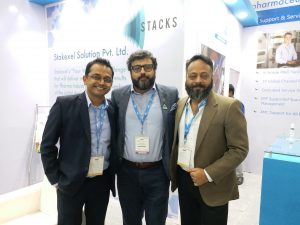Three mavericks established Stakexel. The first of these is Dev Ashish Bakshi, managing director of Tapasya, a company he founded in 1962. The Thane-based company is well known for its contribution to the pharmaceutical, nutraceutical, food, chemical, cosmetics, and other allied industries. It offers granulation, drying, milling, blending, micronizing, coating, and pelletizing process solutions across India and globally.
Bakshi realized that his customers were not able to harness data integrity, which smart manufacturing solutions offered, in spite of having Tapasya’s intelligent machinery. Thus Bakshi created another entity – Stakexel. Also, being the managing director of Stakexel, he plans to integrate the core competence areas of the two companies to make the machines even smarter.
In a recent conversation at pharma pro&pack in Hyderabad, Bakshi said, “Tapasya has been in the pharmaceutical domain for the last 60 years, and I have had the good fortune of heading this company for the last 33 years. The first company in India to offer turnkey integrated granulation solutions, we have done more than 1000 projects across the globe. We are present in approximately 58 countries with our subsidiaries in four countries.”
“As our core competence, we bring in integrated granulation lines which are completely compliant with the stringent requirements of the USFDA. Our long association with Indian pharma manufacturing has made us known for USFDA compliant installations. Both customers, as well as regulators, are assured that the equipment, as well as documentation, are in perfect order.”
Pharma industry in India is pharma factory for the world
Speaking about the pharmaceutical industry of India, Bakshi says, “The pharma industry in India is the hub for pharma manufacturing to the world. India is the premier center for manufacturing generic drugs as well as some specialty areas like oncological drugs.”
Bakshi made a sharp observation of the current state of affairs in Indian manufacturing today. It is that major organizations are upgrading to modern machinery, with compliance being the primary driver. But it is the benefits of advanced analytics, the optimal use of vast data, analytical capabilities, and tools that can be multipliers of efficiency and productivity, which should drive modernization. According to him, it is in this area that Stakexel wants to maximize the effectiveness of its customers. Only with modern analytics will Indian pharma be ready for Pharma 4.0. It is Stakexel’s stated mission to make this transformation happen.
Bulusu Chaitanya, director, Solutions and the other maverick at Stakexel, says, “Our automation solutions are beneficial in analyzing large qualified data. It is the right interpretation of the generated data, which can help smart decision making, which, in turn, can increase productivity. Automation is to be seen as a force multiplier. We make smarter machines that result in smarter plants.”
Soumendra Mohanty, founder and chief technical officer of Stakexel, who completes the unusual trio of Stakexel, says, “The major challenge of the Indian pharma industry is the seamless flow of data from machine to the top level, and that is what Stakexel wants to turn into an opportunity. We aim to equip Indian pharma manufacturing to tackle the new age challenges with our tools and solutions in attaining international standards. We have the expertise to connect the data with automation while also delivering cybersecurity – an emerging and as yet under-appreciated process-challenge”
Industry 4.0 is a new mantra for excellence
According to Bakshi, industry 4.0 is going to be a tool for the industry. He says, “Globally, the R&D and development of new molecules has taken a back seat, and most of the companies around the world are making efforts to make production lines cost-effective. The key investment is going into driving this continuous improvement programs, and automation is the only way forward.”
Speaking about the industry’s reluctance to adopt automation in its plants, Bakshi says, “This is the time when the industry has to wake up to the automation of plants, processes, and systems and it is heartening to see that visionary manufacturers have already taken cognizance on this. We hope that all of manufacturing follows suit to avoid unwarranted trouble in the near future.”
Simple, minimal, and functional automation
Mohanty says, “We can simplify your business with the technology because we not only understand ‘What’ but we also understand the ‘How and Why.’ We can do minimal changes to give you the best output. We will make the best use of whatever is existing around you to ensure the best productivity.
“It’s a myth that if you are going to opt for new technology, you need to change the entire setup. With the existing setup, the same machines can be smart, and the same environment can become a factory 4.0 – all this with minimal changes. In most cases, it is a combination of tactical workforce re-training combined with a strategic orientation to vision.”
“Automation need not be seen as a disruptive manufacturing strategy. It is a simple exercise in redefining the operating environment. It is an enabler to make the best use of the existing technology to drive cost and quality optimization. For instance, when I taught my dad that he could do a video call on WhatsApp with my daughter, he was zapped. I see that many organizations are equally befuddled when we tell them what other capabilities their existing plants already have and which have not been used in an organized manner to make their plant, well, – a smart plant. Our vision is to continue designing solutions and delivering innovation, be it technology, processing, or machine automation. We are working on a self-corrected technology in machines,” concludes Bakshi.






